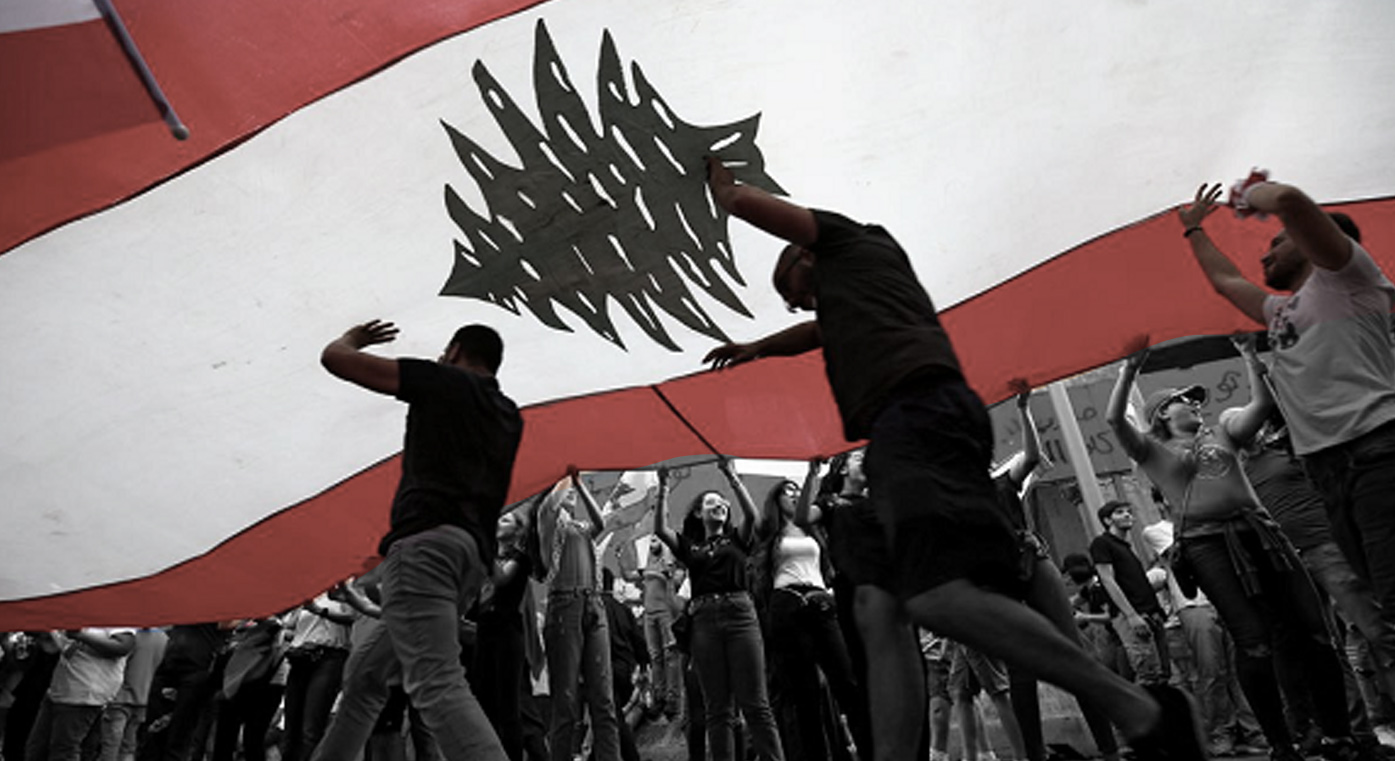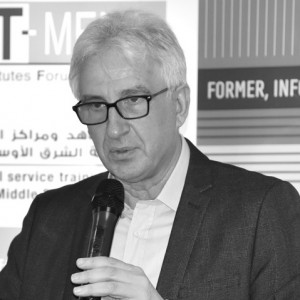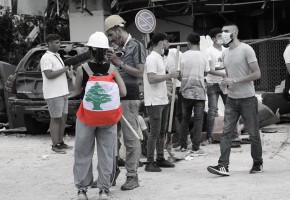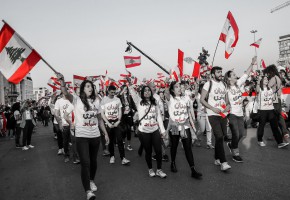
Adib Nehmeh

Introduction
Lebanon is going through a sweeping structural crisis that necessitates transitioning from the current neo-patrimonial state model into one that embodies a modern democratic civil state, which adopts development policies based on social justice and human rights. This article outlines the desired destination while recognizing it as a long, tortuous, and difficult process requiring fundamental transformations in social power relations, the mechanisms of producing institutions of power, and the nature of the policies that must be adopted.
The current crisis makes it impossible to separate the political, economic, social, cultural, and environmental/climatic dimensions. Thus, while seeking a transformative role - such as the developmental/human rights approach, civil society's tasks assume a broad political nature. Such tasks emerged strongly in a practical and timely sense with the popular movement in the streets on October 17, 2019, and they remain pertinent today. However, this civil society component needs to address the challenges imposed by its role, developing the appropriate strategy in light of the evident multiplicity of "external and internal" actors and the great discrepancy in power and influence between them.
External and Internal
Lebanon's state and institutions are currently approaching a situation of permanent failure, without a president, a resigned caretaker government, a dysfunctional judiciary, a bankrupt banking system in denial, an unprecedentedly deteriorating living situation, and scarce and costly essential services. The failure is accompanied by the precarious balance of power and positions in Parliament following the recent elections, which transformed it from a state of monolithic domination of the authoritarian alliance and the monolithic and excessive control of the House Speaker. On the other hand, the popular movement (2019) has lost its momentum and general unity. It is highly dispersed and shifted into partial and factional demands that weaken its ability to influence the course of the crisis and overcome the situation.
This situation increases the influence of external factors (regional - international) in the internal track, especially concerning activating the political system from the perspective of its components. Based on the trends in global and regional diplomacy and press and media reports, the situation is akin to a permanent surrender to external interference in the smallest details of the institutional crisis (its most prominent expression is the election of a president, then the formation of a new government). It has become very normal and accepted by most parties for there to be a French initiative, for example, that calls directly for the election of a specific candidate (that is, Suleiman Franjieh, the candidate of Hezbollah - Amal) or for other parties to expect, or rather to beg for a particular Saudi-Arab regional position to balance the Iranian-French-Hezbollah regional position in Frangieh's support. In contrast, some traditional and non-traditional opposition forces seek to "Lebanonize" the decision, albeit formally, through a counter-candidacy.
There are renewed bets on regional (and international) transformations to end the unilateral dominance of one of the two components of power (formerly the March 8 coalition) following the former prime minister's resignation, which weakened the position of the second component. After the Saudi-Iranian rapprochement and Syria's return to the Arab League, the Arab summit in Jeddah was expected to reach a deal and lead to a regional settlement between those who favor the consolidation of Iran's role in Lebanon and those who seek a stronger Saudi-Arab position. However, the statement of the Arab summit did not deviate much from the previous context. It emphasized support for the Lebanese state and consolidating its effective rule. However, the statement did not include practical measures, as Lebanon was not an immediate priority in the settlement between Saudi Arabia and Iran. Instead, it is expected to be dealt with later (probably soon). Consequently, the current balance in Lebanon shall be maintained for a while, fueling the internal conflict between the parties to be resolved by those who can.
Finally, in this prevailing context of surrender to external actors, internal questions, especially at the national level, are not exclusively governed by the dominant international and regional factors and dynamics. Furthermore, those factors may not be decisive in erasing the effect of the internal balance of power. However, despite the dominance of external factors, internal factors will have a fundamental role in several directions. Whoever pulls the inner balance of power in their favor will be able to decide based on this relative independence of levels and the interval between regional and international understandings. On the other hand, the less powerful party could exploit the current moment's fragility and the need to respect constitutional deadlines to expand the base of convergence, even if partial or temporary. Thus, its ability to disrupt the path of stabilizing the balance of power would be enhanced in the wasted time until regional and international settlements reach their goals, whatever that may be. The above situation was evident in the conflict between the components of power, a struggle with critical consequences on the country's future, and the way out of the crisis.
Civil Society's Place
So, what space does civil society, precisely its transformative component, occupy in this situation? The dominance of external over internal factors leads to marginalizing civil society and requires adopting a more radical stance, which is a national political task par excellence. On the other hand, the disruption of institutions and the state's dissolution marginalize civil society's role or make its tasks more difficult. The rule of law is being disrupted, from the Constitution to the judiciary, including the private sector that dominates the economy. In this context, the transformative civil society, distinct from the state/authority and the market, could face a blurry situation. Multiple opponents spread in various aspects of social life without legal control of their behavior. Thus, civil society is pushed to adopt a more radical position in the face of this decay.
Moreover, the conflict between the components of power and the contradiction between international-regional projects stop at the ability of new actors from outside the system to become influential factors in the political and institutional course. It implies subverting civil or political changes inside institutions (for example, the new deputies from the October 17 movement) or outside them. This context is the basic common pillar in the strategies of the authority's various components.
When civil society took the form of a broad popular protest movement in the streets, it led to imbalances and divisions in power and order, and people became political actors who brought about some change. The traditional strategies of the various parties intersected in two complementary tracks. The first was an attempt to pre-empt the popular movement and use it to their advantage. The second was to remove people from the streets, disrupting their political activities in various ways (direct repression, COVID-19 measures, exacerbating the livelihood crisis, dividing the movement and creating contradictions inside it, and spreading accusations of links to foreign agendas).
The second strategy's apparent success paved the way for authoritarian parties to regain the initiative, monopolize political activity, and dominate public space, especially through the partisan and biased media outlets that openly act as extensions of regional and international projects. Furthermore, these outlets usually function as if social and civil society forces are completely out of the game.
Civil Society's Tasks
Civil society is tasked with pulling Lebanon out of the bottleneck and crisis toward suitable alternatives and solutions that prevent the recurrence of past and current problems as much as possible. Once again, these are tasks of a political and urgent nature. Exiting the dark tunnel of the Lebanese crisis requires achieving complex tasks on four levels:
1. Restore Lebanon's internal decisions: Lebanon’s decisions are seized in favor of external parties of varying influence, capabilities, and tendency to meddle. National factors need to prevail again based on Lebanon’s national interests. Parties should not promote projects whose appearance is internal but are extensions or tools of regional or international projects. The matter directly relates to national sovereignty in its external dimension.
2. Restore institutional decisions: Power in Lebanon lies outside institutions. It is in the hands of political parties and leaders that control actual decisions (whether nationally or more locally). In particular, the executive authority has no power. Instead, it is an institutional and legal facade for outside decisions. Thus, the decisions and powers of constitutional institutions must be restored, and they must work within the Constitution and applicable laws. They must not be completely separated, as is currently the case. Thus, a state of rights and law must be established instead of a state that is outside the law.
3. Renew institutions: The above must take place according to democratic and representative mechanisms that reflect the new reality after October 17. They must also adhere to international standards for proper representation. For example, elections based on an unconstitutional law, tailored in advance according to the size of the parties in power, and that do not guarantee freedom of choice for citizens must no longer be formally accepted and used as an excuse by external parties and local authorities. Such a situation contributed to the civil war in 1975. It allows the crisis to continue and obstructs the ability to reform from within the institutions. The conditions and specifications for the renewal of institutions are a prerequisite to overcoming the crisis, which should not be overlooked.
4. Adopt alternative economic and social policies: The crisis has deep economic and social implications and cannot be merely solved by the concept of citizenship and the rule of law. Thus, it is also necessary to define the main directions of the content of policies that constitutional institutions and their mechanisms must adopt to end the crisis. Consequently, none of the main components of the solution should be sacrificed or postponed, with a unilateral focus on one dimension and neglecting others. The so-called restoration of sovereignty does not solve the banking, economic, and social crises. Similarly, economic and social reform is impossible without political and institutional reforms.
What is to be done?
Overcoming the crisis and proposing alternatives cannot happen without a real social dialogue. The aim of these alternatives is clear. The human rights system and the concept of development must inspire their general principles. However, their concrete and implementable formulation must occur through a social dialogue in which civil society has a fundamental and equal role with other parties.
However, the idea of dialogue faces two difficulties that must be resolved in advance:
- The first pertains to the identity of the party that can be trusted to manage the dialogue.
- The second difficulty is the ability to hold a real dialogue with guarantees of commitment to its results between equal parties in light of the current balance of power, the dominance of the logic of power over the power of logic, and the constant presence of weapons outside the state on the table.
Civil society, expressed in movements, unions, associations, and networks, is not supposed to have an agenda different than that of the people in balancing political, economic, and factional power. Its actual plan must involve an exit from the crisis and a move towards a modern, democratic, civil state that adopts a system of rights and development. Thus, if the agenda is translated into the four major goals presented above, should they be ignored to focus exclusively on humanitarian and sectoral work and compensating for the state and its institutions' shortcomings?
The tasks are difficult, and civil society's response to them is even more demanding.
Adib Nehmeh
Recent publications
Related publications


